WASHINGTON – Maryland Rep. Dutch Ruppersberger, D-Cockeysville, joined House Intelligence Committee Chairman Mike Rogers, R-Mich., Tuesday to unveil a bipartisan bill that would end the government’s mass collection of metadata and instead allow the government to order communication companies to search their files for more specific information.
The FISA Transparency and Modernization Act is the committee’s latest attempt to quell Americans’ worries about the systematic dragnet collection of millions of Americans’ phone and other electronic data by federal agencies.
“The metadata was legal…but there was a perception issue,” said Ruppersberger, the ranking Democrat on the Intelligence Committee. “What we’re trying to do here is alleviate that concern that there could be abuse in the future.”
The bill is making its debut the same week that the Obama administration is expected to release its own proposal for data collection reform.
The administration’s proposal will call for an end to collecting information in bulk, too, according to the New York Times. One key difference between the two is that the House committee’s bill would not require that the government get a warrant before issuing a directive to the phone companies.
Under Ruppersberger’s proposal, the data request would be reviewed afterward by the Foreign Intelligence Surveillance Court, which could reject it and force the government to discard the records.
“Basically, what we’re doing is listening to the American people, but our committee has a responsibility to protect the American people from terrorist attacks,” Ruppersberger said.
Ruppersberger’s proposal would also implement procedures to ensure that only data concerning terrorist and foreign intelligence targets is sought. One such process would require the government to pass a “RAS”, or reasonable and articulable suspicion, test to determine if a phone number is associated with terrorism.
The proposal has already drawn criticism from some members of Congress and privacy organizations.
Rep. Jim Sensenbrenner, R-Wis., co-author of a competing bill and an outspoken critic of the National Security Agency, said in a statement Monday that the FISA Transparency and Modernization Act “limits, but does not end, bulk collection.”
Sensenbrenner’s bill, the USA Freedom Act, has 163 co-sponsors in both chambers and prohibits the NSA from collecting Americans’ identifying information through tracked communications with foreigners. Also under the USA Freedom Act, data would need to be relevant to an ongoing investigation in order to be accessed.
Michelle Richardson, legislative counsel with the American Civil Liberties Union, said in a statement Tuesday that the House Intelligence Committee’s bill is “on the wrong track” and that its sponsors are using “reform momentum as a pretext for expanding government power.”
“The bill’s modest improvements to the phone records program are not worth demolishing the important judicial role in overseeing these programs,” she said.
Richardson applauded the Obama administration’s plan to end the bulk collection of phone records as a crucial first step, but said the most attractive proposal to the ACLU is the far-reaching USA Freedom Act.
Ruppersberger said Tuesday that the USA Freedom Act would “make our country less safe.”
Concerns about the government’s collection of phone, e-mail, and Internet data came to light 10 months ago when former NSA contractor Edward Snowden began leaking classified documents about the programs the agency was conducting.
Although many hail Snowden as a hero for his whistleblowing actions, Ruppersberger does not.
“Snowden took an oath and he turned his back on (his country),” Ruppersberger said.
Snowden is currently under temporary asylum in Russia.

